2022 PROGRESS REPORT









OUR VISION
The International Bottled Water Association will be the leading voice for healthy hydration and the bottled water industry.
OUR MISSION
To serve our members and the public by championing bottled water and other healthy hydration choices, while promoting an environmentally responsible and sustainable industry.
2023 IBWA BOARD OF DIRECTORS
CHAIR
Henry R. Hidell, III
Hidell International Hingham, Massachusetts
VICE CHAIR
Hih Song Kim
BlueTriton Brands Stamford, Connecticut
TREASURER
Joe Bell
Aqua Filter Fresh, Inc. Pittsburgh, Pennsylvania
IMMEDIATE PAST CHAIR
CR Hall Hall’s Culligan Water Wichita, Kansas
PRESIDENT AND CEO
Joe Doss International Bottled Water Association Alexandria, Virginia
Ryan Heiken
Crystal Clear Bottled Water Des Moines, Iowa
Brian Hess Niagara Bottling, LLC Diamond Bar, California
Douglas Hidding Blackhawk Molding Company, Inc. Addison, Illinois
Dan Kelly
Polymer Solutions International, Inc. Medford, New Jersey
Jillian Olsen
Cherry Ridge Consulting Sciota, Pennsylvania
David Redick Steelhead, Inc. San Antonio, Texas
Robert Smith Grand Springs Distribution Alton, Virginia
2023 IBWA EXECUTIVE COMMITTEE
CHAIR
Henry R. Hidell, III
Hidell International Hingham, Massachusetts
Joe Bell
Aqua Filter Fresh, Inc. Pittsburgh, Pennsylvania
Cate Gutowski
Primo Water Tampa, Florida
CR Hall Hall’s Culligan Water Wichita, Kansas
Brian Hess
Niagara Bottling, LLC Diamond Bar, California
Dan Kelly
Polymer Solutions International, Inc. Medford, New Jersey
Hih Song Kim
BlueTriton Brands Stamford, Connecticut
Robert Smith
Grand Springs Distribution Alton, Virginia
Bill Young
Absopure Water Company, Inc. Plymouth, Michigan
BOARD MEMBERS
Shayron Barnes-Selby
Primo Water
Tampa, Florida
Michael Efron
The Waterways Company
Rancho Santo Margarita, California
Tanner Hanstein
Eureka Water Company
Oklahoma City, Oklahoma
Brad Wester Premium Waters, Inc. Minneapolis, Minnesota
Bill Young Absopure Water Company, Inc. Plymouth, Michigan
1 2022
PROGRESS REPORT |
IBWA
A LETTER FROM THE PRESIDENT
I note with great pride that—for the seventh consecutive year—bottled water is the No.1 beverage in the United States, by volume. In 2022, bottled water volume surged to an alltime high of 16 billion gallons, according to preliminary figures from Beverage Marketing Corporation, a 2% increase over last year. Retail sales hit $44.8 billion dollars, an 11.5% increase, and per capita consumption reached a new high of 47.7 gallons, a 1.3% increase. This continued success is
result of the hard work of the IBWA team of members, staff, and consultants. The 2022 IBWA Progress Report summarizes our most notable accomplishments of the past year.
Although consumers continue to demand bottled water products with increasing enthusiasm, our industry faced numerous efforts at the local, state, and federal level to restrict access to or ban the sale of bottled water. Noteworthy is the effort by the U.S. Department of the Interior (DOI) and the General Services Administration (GSA) to reduce the use and sale of single-serving plastic packaging across all federal agencies. IBWA met with DOI staff and provided detailed feedback to the GSA explaining how recyclable bottled water containers differ from items that are truly “single-serve” plastics and noting that any policy implemented must not single out bottled water and must be based on facts (not false claims made by anti-bottled water activists).
The burdensome 25% tariffs on water coolers imported from China was a
pressing issue for many IBWA members in 2022. To date, the Biden Administration has not removed those tariffs or granted exclusions for bottled water coolers. However, IBWA found a way to provide our members relief by supporting a proposal, adopted by the U.S. Customs and Border Protection office, to change the import code used for hot-andcold water coolers and dispensers. That means as of November 6, 2022, the 25% tariff is no longer levied on those coolers, which make up the majority of coolers sold in the United States.

On the recycling front, IBWA supported the Recycling and Composting Accountability Act and the Recycling Infrastructure and Accessibility Act. These important bills will help establish a better understanding of current U.S.
recycling capability and improve access to recycling programs. IBWA also produced a social media campaign—#H2OFactCheck— to provide facts to consumers and clear up common bottled water and recycling misconceptions. Members can find the campaign materials on PutItInTheBin.org.
Continuing with the theme of environmental stewardship, the push to enact extended producer responsibility (EPR) legislation continued in 2022, with 40 EPR-related bills considered. Altogether, there are now four states that have passed EPR laws: California, Colorado, Maine, and Oregon. When IBWA gets involved in EPR discussions, it is to ensure that the proposed programs are reasonable and have specific goals that are measurable, achievable, cost-effective, include an evaluation process—and include all consumer goods packaging types.
2 | INTERNATIONAL BOTTLED WATER ASSOCIATION
Joe Doss
the
In 2022, several western states faced drought conditions, and IBWA continued to use our Hydrate The States campaign to educate consumers and decision makers about bottled water’s small water use. Industry must have a voice in any water scarcity discussions, and IBWA’s “Let’s Be Clear About Bottled Water” social media campaign reached more than 3 million people, equipping them with bottled water facts to share with family, friends, and elected officials.
a healthy diet is recognized. The current DGAs stress that calorie-free drinks— especially water—should be the primary beverages consumed and note the health benefits of drinking water for older adults. IBWA has provided preliminary written comments with suggested dietary guidelines topics and questions for the 2025-2030 DGAs. In 2023, we will also continue our efforts to have water included on the MyPlate nutrition guidance, in addition to dairy.
On the regulation front, in 2022 the U.S. Food and Drug Administration (FDA) issued a proposed rule that would allow bottled water products to be labeled as “healthy.” This is a goal that IBWA has been working on for many years and will continue to pursue in 2023. FDA also issued its final rule for fluoride in bottled water—making several changes to the original proposed regulation based on IBWA’s comments. This included allowing the disclosure of the per-liter amount of fluoride in bottled water rather than the per-serving amount.
The process for the 2025- 2030 Dietary Guidelines for Americans (DGAs) has begun, and IBWA continues our work to ensure the important role water plays in
IBWA is a closeknit community of bottler, supplier, and distributor members; staff; and counsel working together to learn and execute industry best practices and develop political champions that help ensure a favorable business, regulatory, and public affairs climate for the bottled water industry. We share a common goal: Deliver safe, quality, healthy bottled water products to our consumers. And we’ll go above and beyond to ensure that America’s favorite packaged drink remains on store shelves.
Joe Doss IBWA President and CEO

3 2022 IBWA PROGRESS REPORT |
2023 IBWA MEETING DATES FEBRUARY 21-23 IBWA Virtual Winter Board of Directors and Committee Meetings JUNE 5-8 IBWA Summer Board of Directors and Committee Meetings and Capitol Hill Visits Hilton Old Town Alexandria, Virginia SEPTEMBER 11-14 IBWA Annual Business Conference Las Vegas, Nevada (in conjunction with PACK EXPO) Meetings
INDUSTRY NUMBERS
BOTTLED WATER: GIVING CONSUMERS WHAT THEY WANT
Members of the International Bottled Water Association (IBWA) note with great pride that U.S. consumers have made bottled water their favorite packaged drink for the seventh year in a row. Bottled water’s continued success is the result of the hard work performed daily by the IBWA team of members, staff, and consultants. We are committed to ensuring that consumers can find safe, quality, and refreshing bottled water products on their store shelves.
According to the Beverage Marketing Corporation (BMC), bottled water first became America’s No.1 beverage in 2016, and it has held that title ever since. BMC's preliminary figures for 2022 show U.S. consumption of bottled water stands at 16 billion gallons, up 2% over last year; retail sales are at $44.8 billion dollars, an 11.5% increase; and per capita consumption is at 47.7 gallons, a 1.3% increase. Those statistics demonstrate that, despite efforts by our critics to discourage people from drinking bottled water, sales and consumption continue to grow.
As consumers continue to make healthy hydration and lifestyle choices, bottled water continues to help them meet their goals. Research shows that almost all bottled water volume gains during the past 20 years have come from the decreased consumption of carbonated soft drinks and fruit drinks. Knowing we are helping consumers make healthy choices is a huge motivator for IBWA.
Our goal is to deliver safe drinking water to consumers in a variety of packaging choices: single-serving bottles, 1- and 2-gallon jugs, and 5-gallon bottles for water coolers. IBWA members provide bottled water products
2022[P]
that not only support health but also provide a “vision of hope” during times of crisis. Water is essential to life, and IBWA is committed to providing life-sustaining and life-affirming bottled water products.
4 | INTERNATIONAL BOTTLED WATER ASSOCIATION
VOLUME SHARE OF STOMACH BY U.S. BEVERAGE SEGMENT P=preliminary Source:BeverageMarketingCorporation Energy Drinks 1.5% Fruit Beverages 4.2% Tea 5.4% Milk 7.8% Beer 9.9% Carbonated Soft Drinks 18.7% Bottled Water 25% Wine/Spirits 1.4% Value-Added Water 1.5% Tap/Others 9.4% Coffee 10.8% Sports Drinks 3.0%
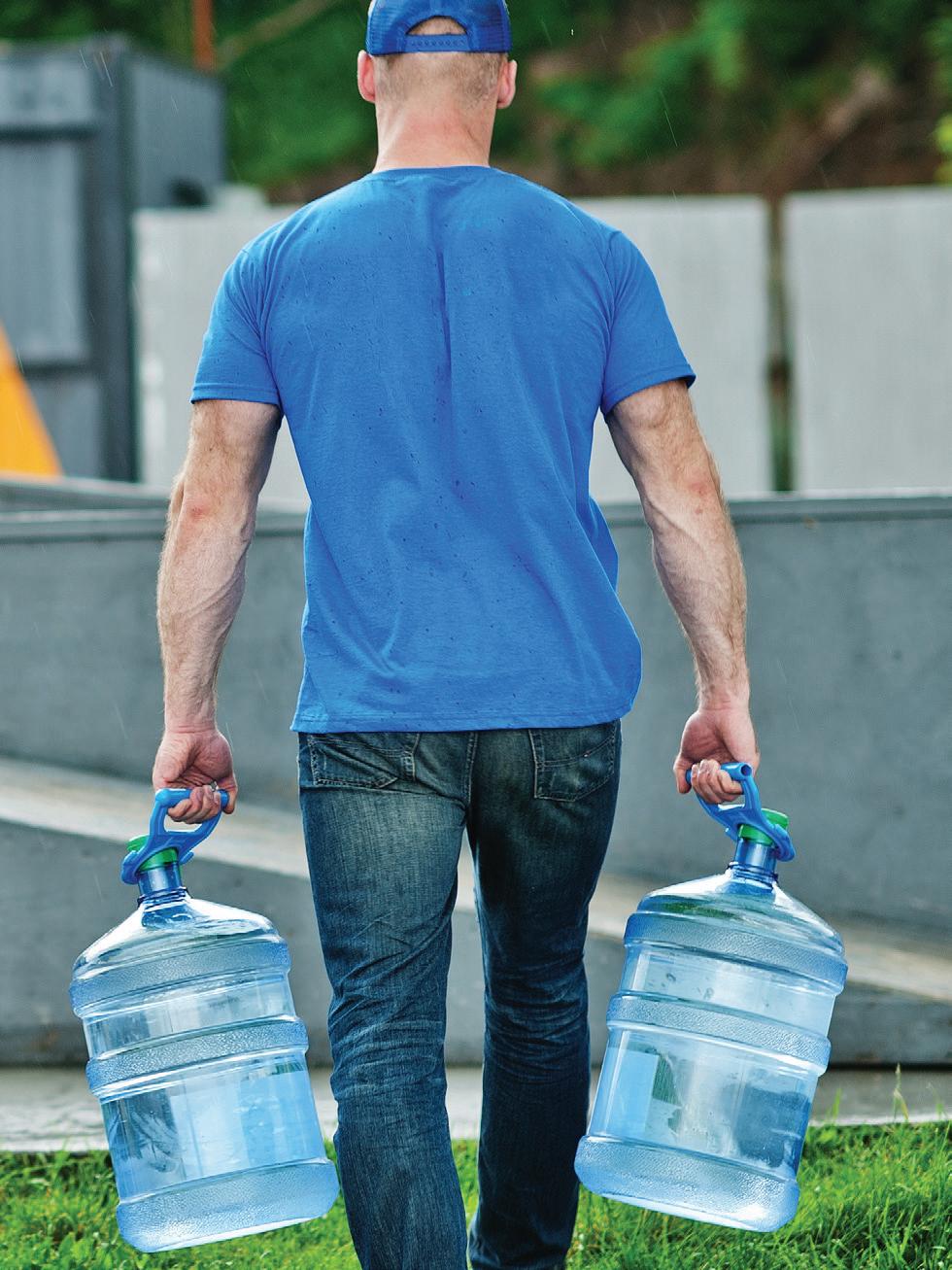


BOTTLED WATER VOLUME 16 BILLION GALLONS— A 2% INCREASE OVER 2021 PER CAPITA CONSUMPTION 47.7 GALLONS— A 1.3% INCREASE RETAIL SALES $44.8 BILLION DOLLARS— AN 11.5% INCREASE










6 IBWA SOUGHT— AND GOT—MEMBERS RELIEF FROM A 25% TARIFF ON HOT-AND-COLD WATER COOLERS IMPORTED FROM CHINA THROUGH AN IMPORT CODE CHANGE IBWA IS COMMITTED TO ENSURING THAT HEALTHY, HYDRATING BOTTLED WATER PRODUCTS ARE AVAILABLE FOR THE CONSUMERS WHO WANT THEM
RESTRICTING ACCESS TO BOTTLED WATER
EFFORTS TO BAN THE SALE OF BOTTLED WATER
While IBWA is committed to ensuring that healthy, hydrating bottled water products are available for the consumers who want them, anti-bottled water groups are active, attempting to convince consumers and lawmakers that bottled water should not be sold. Their stated objective is to put our companies out of business. Thus, they spread false and misleading information about our products and target all bottlers—both big and small companies and the home and office delivery (HOD) and small-pack segments of the industry. On all fronts, IBWA facts back with facts.
In 2022, there was an increase in the number of local, state, and federal proposals that would restrict or ban the sale of our products.
One standout example concerns the work by the U.S. Department of the Interior (DOI) and the General Services Administration (GSA) to reduce the use and sale of single-serving plastic packaging across all federal agencies. Although not specifically mentioned, IBWA expects the National Park Service, which is part of DOI, will once again seek to ban the sale of bottled water in national parks. In 2022, IBWA met with DOI staff and provided detailed feedback to the GSA on why any policy implemented must not single out bottled water and must be based on facts (not false claims made by anti-bottled water activists). DOI and GSA will likely continue with this
objective in 2023, and IBWA will work to ensure that any final policy is fair and equitable.
While several states addressed the issue of single-use plastics in 2022 by seeking to ban plastic bags, food service ware, and various other packaging types, a few proposals targeted beverage containers, including bottled water, but none were given serious consideration. At the local level, however, bottled water sales bans were on the agenda. In Massachusetts, three communities— Sandwhich, Mashpee, and Dennis—provided good news, as they repealed previously approved bans on the sale of bottled water in plastic containers.
Because these local fights are best fought by community leaders, IBWA has produced social media materials that anyone can download from the IBWA website to help educate their local councils and neighbors. Those materials are based on research that shows bottled water products in PET plastic containers have the smallest environmental impact of all beverages. Bottled water uses less water, emits fewer greenhouse gases, and generates less waste. IBWA also takes that information to Capitol Hill to help educate members of Congress about the small environmental footprint of plastic bottled water containers, especially when compared to other packaging types.
25% TARIFFS ON WATER COOLERS FROM CHINA
A pressing issue for many IBWA members has been the burdensome 25% tariffs on water coolers imported from China, which have significantly increased the cost of water coolers. In 2022, IBWA staff and members worked hard to overturn those tariffs by meeting with members of Congress, the U.S. Trade Representative (USTR), and the U.S. Department of Commerce; coordinating an industry letter-writing effort to Congress, USTR, and the Departments of Commerce and Treasury; and organizing and submitting editorials in regional and national news outlets.
To date, the Biden Administration has not removed the 25% tariffs or granted exclusions for bottled water coolers. However, IBWA found another way to get relief from these burdensome fees. IBWA supported a proposal that was adopted by the U.S. Customs and Border Protection office to change the import code used for hot-and-cold water coolers and dispensers. This successful action, which became effective on November 6, 2022, means that the 25% tariff is no longer levied on hot-and-cold coolers, which make up the majority of coolers sold in the United States. In 2023, IBWA will continue our work to remove the tariffs for all other water coolers from China.
7 2022 IBWA PROGRESS REPORT |
RECYCLING HOW IBWA SUPPORTS THE U.S. RECYCLING INFRASTRUCTURE
U.S. recycling practices continue to garner a lot of attention, and IBWA continues its longstanding support of legislation that will improve the recycling infrastructure in America.
In 2022, IBWA backed two bills in Congress that would improve the U.S. recycling infrastructure: the Recycling and Composting Accountability Act and the Recycling Infrastructure and Accessibility Act. Those bills establish data collection and reporting requirements to gain a better understanding of U.S. recycling capabilities and improve access to recycling programs for disadvantaged communities. IBWA worked with members of Congress seeking passage of this legislation, and both bills passed the Senate with strong, bipartisan support. In 2023, IBWA will continue to educate members of Congress on how these bills benefit U.S. recycling efforts.
“PUT IT IN THE BIN” SOCIAL MEDIA CAMPAIGN
To populate the social media space with facts about bottled water and recycling, IBWA’s Put It In The Bin initiative develops campaigns to promote the facts about recycling PET and HDPE beverage containers and push back on any false statements about the recyclability of plastic containers. For the Fall 2022
campaign, IBWA produced Instagram reels and Facebook stories that address the most common falsehoods about bottled water container recycling. We share campaign content with IBWA members and our partners and allies, such as Keep America Beautiful and The Recycling Partnership, to help amplify the reach of our pro-recycling messaging.
As we go to press, the numbers are looking great. We’ve posted three Instagram reels and Facebook stories and have garnered thousands of impressions and even more ad plays. IBWA members are encouraged to share these reels on all of their social media accounts by going to PutItInTheBin.org and clicking on “toolkits” in the navigation bar and then #H2OFactCheck to download the campaign materials.
AMERICA RECYCLES DAY
For the past six years, IBWA has been a national sponsor of Keep America Beautiful’s America Recycles Day (ARD), held annually on November 15. Through this partnership, which includes multiple posts on Keep America Beautiful’s Facebook, Instagram, and Twitter accounts, IBWA is recognized for its efforts in helping to educate consumers about recycling. Analytics from the campaign show that there were more than 7,000 mentions in the media on America Recycles Day—
reaching 689 million viewers. The annual ARD press release, which has a global reach, also thanks IBWA for its sponsorship. IBWA values the partnership with Keep America Beautiful—and will again sponsor ARD in 2023.
RECYCLING PLANT TOUR
IBWA is always looking for new ways to keep members up to date on the latest recycling technologies. In 2022, IBWA partnered with the Sims Municipal Recycling (SMR) facility, in Brooklyn, New York, to host a virtual tour. SMR serves the NY-NJ Metro Region and is the largest material recovery facility in North America. This educational opportunity offered IBWA members the chance to learn about the recycling process for PET water bottles, HDPE jugs, boxed cartons, aluminum cans, and case wraps. A video of this one-hour tour is available on the IBWA website for certified plant operators (CPOs) to view and earn continuing education credits.
8 | INTERNATIONAL BOTTLED WATER ASSOCIATION








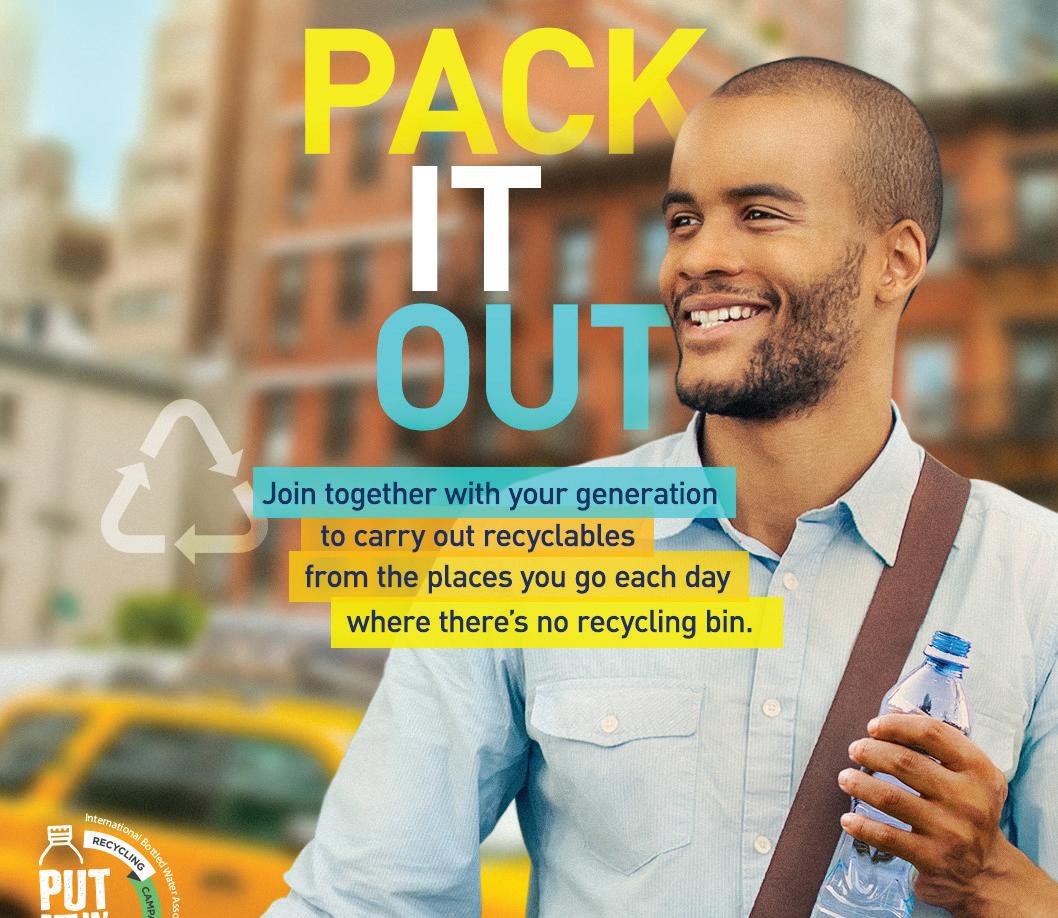

IBWA SPONSORED AMERICA RECYCLES DAY: 1.5 BILLION IMPRESSIONS + 7,000 MENTIONS + 689 MILLION VIEWS
75
An act to amend Section 41821.5 of, to add Chapter 3 (commencing with Section 42040) to Part 3 of Division 30 of, and to repeal Section 42064 of, the Public Resources Code, relating to solid waste.


[Approved by Governor June 30, 2022. Filed with Secretary of State June 30, 2022.] legislative counsel’s



SB 54, Allen. Solid waste: reporting, packaging, and plastic food service ware.
(1) The California Integrated Waste Management Act of 1989, administered by the Department of Resources Recycling and Recovery, generally regulates the disposal, management, and recycling of solid waste. The act requires disposal facility operators to submit information to the department on the disposal tonnages that are disposed of at the disposal facility, and requires solid waste handlers and transfer station operators to provide information to disposal facility operators for purposes of that requirement. The act requires recycling and composting operations and facilities to submit periodic information to the department on the types and quantities of materials that are disposed of, sold, or transferred to other recycling or composting facilities or specified entities.

This bill would provide that these reporting requirements do not apply to materials that are used by facilities defined as end users pursuant to the regulations adopted by the department or that are otherwise exempt pursuant to those regulations. The bill would also clarify that recycling is not limited to the processing of materials that would otherwise become solid waste, but also includes processes applied to nonhazardous materials that have value principally as a feedstock for that processing, regardless of whether the materials have been discarded or constitute solid waste. The bill would further clarify that, regardless of whether a recycling operation or facility is required to register and report pursuant to specified regulations adopted by the department, that recycling operation or facility is not a solid waste handler unless the operation or facility is, in fact, handling solid waste.



(2) The California Integrated Waste Management Act of 1989 regulates the disposal, management, and recycling of, among other solid waste, plastic packaging containers and single-use foodware accessories.




The Sustainable Packaging for the State of California Act of 2018 prohibits a food service facility located in a state-owned facility, operating on or acting as a concessionaire on state property or under contract to provide food service to a state agency, from dispensing prepared food using a type of food service packaging unless the type of food service packaging is on 93






Senate Bill No. 54 CHAPTER
digest
STATE OF CALIFORNIA AUTHENTICATED ELECTRONIC LEGAL MATERIAL NEARLY 400 PIECES OF LEGISLATION AND 200 REGULATIONS THAT HAD POTENTIAL IMPACT ON THE INDUSTRY WERE INTRODUCED IN 2022 4 STATES HAVE PASSED EPR LAWS IN 2022, 40 EPR-RELATED BILLS WERE CONSIDERED IN 2023, MORE RECYCLED CONTENT BILLS WILL BE INTRODUCED
POLICY APPROACHES TO WASTE MANAGEMENT
EXTENDED PRODUCER RESPONSIBILITY
IBWA has a vested interest in ensuring that recycling policies advance the circular economy and reduce waste. A relatively new policy approach to reducing waste is extended producer responsibility (EPR). A main goal of EPR legislation is to give producers an incentive to design products in a way that makes them easier to reuse or recycle. Here, the bottled water industry has the advantage, as all bottled water containers are 100% recyclable.
In 2022, 40 EPR-related bills received consideration. When IBWA gets involved in EPR discussions, it is to ensure that the proposed programs are reasonable and have specific goals. Those goals should seek strong environmental performance while being measurable, achievable, and cost-effective, and include an evaluation process. Importantly, any EPR program should include all consumer goods packaging types (i.e., plastic, aluminum, glass, steel and other metal, paper, multilayer packaging, and other print materials).
In Congress, bills were reintroduced that would impose nationwide EPR requirements, create a national bottle deposit program, and mandate the use of recycled content material. IBWA met with key members of Congress to make them aware of our
concerns with those proposals before the bills stalled in the House and Senate.
In the states, sweeping EPR legislation (Senate Bill 54) was passed in California in 2022. IBWA worked with other groups to make sure that the new law exempts product containers that are part of the state’s bottle deposit program, which includes smallpack bottled water containers. The law also exempts containers that are refilled or reused, which covers 3- and 5-gallon bottled water containers. However, secondary packaging (e.g., shrink-wrap and cardboard case packaging) and tertiary packaging (e.g., pallets and other B2B packaging material) are not included.
In 2023, IBWA will be looking for opportunities to addresses some of the provisions in SB 54 we have issues with and amend the law.
Colorado also passed EPR legislation. Because the state does not have a bottle deposit program, this new law will impact the bottled water industry more than in the other states that have addressed this issue. No exemption is provided for beverages, and that includes bottled water.
Currently, four states have EPR laws: California, Colorado, Maine, and Oregon. The push to enact legislation on these issues will persist; therefore, IBWA will continue
to be involved in these discussions to make sure that the bottled water industry’s concerns are addressed.
STATE MANDATORY RECYCLED CONTENT LAWS
IBWA continues to follow the latest developments for recycled content mandates in the states. Maine and New Jersey are the latest states to enact mandatory recycled content legislation, joining California and Washington.
The Maine legislation requires plastic beverage containers to achieve 25% recycled content by 2026 and 30% by 2031. The New Jersey bill is different from those passed in California, Maine, and Washington. Its mandate starts at 15% in 2024. Then it increases by 5% every three years, until reaching a maximum of 50%.
IBWA expects to see mandatory recycled content bills introduced in many other states in 2023.
11 2022 IBWA PROGRESS REPORT |
As the voice of the bottled water industry, IBWA ensures bottled water facts are accessible for all to find on the internet and proactively defends the industry against any false or misleading statements published through news outlets or on social media.
Critics of bottled water are a small, but vocal, crowd. They continue to make false and misleading statements in an attempt to convince consumers to stop drinking bottled water. However, their impact has been minimal, as IBWA continues to be successful at defending the bottled water industry with facts—and Americans chose bottled water as their favorite packaged drink for the seventh consecutive year in 2022. IBWA considers any false claim published an opportunity to educate the media, consumers, and others about bottled water.
In this high-tech age, there’s still a lot to be said for reaching out to publishers one-on-one to explain the errors in their stories and request corrections to misleading information they have printed. IBWA has a successful record in getting corrections published in stories that appear without the industry’s perspective and ensuring that industry views are included.
IBWA also actively engages in online conversations with both our fans and those that challenge our point of
view. The ability to engage with supporters and critics, the media, and consumers on social media is vital and can directly impact the perception of our industry and our products. IBWA continues to be seen as the leading media resource for bottled water information.
To help IBWA members participate in those online discussions and promote their products, we publish monthly social media toolkits. These toolkits serve to

ensure that the bottled water industry speaks with one voice on issues that are important to us—and they also provide enough content to help members populate their social media calendars. IBWA also publishes these posts on our social media accounts—and in 2022, our reach numbers surpassed 2 million on Facebook and Instagram alone.

12 | INTERNATIONAL BOTTLED WATER ASSOCIATION
MEDIA MONITORING/EDUCATION CORRECTING FALSE STORIES ABOUT BOTTLED WATER IBWA’S SOCIAL MEDIA PRESENCE AND REACH Bottled Water Matters 8,338 likes, monthly reach over 50,000 people Hydration. Health.Happiness. 231 likes @BottledWaterOrg 1,922 followers @BottledH2OBabe 3,041 followers Bottled Water Matters 105 monthly views Bottled Water Matters 1,070 followers


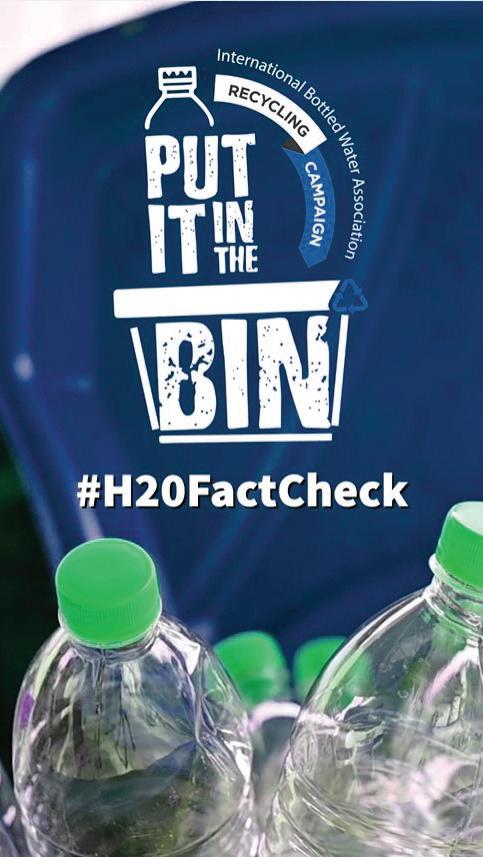
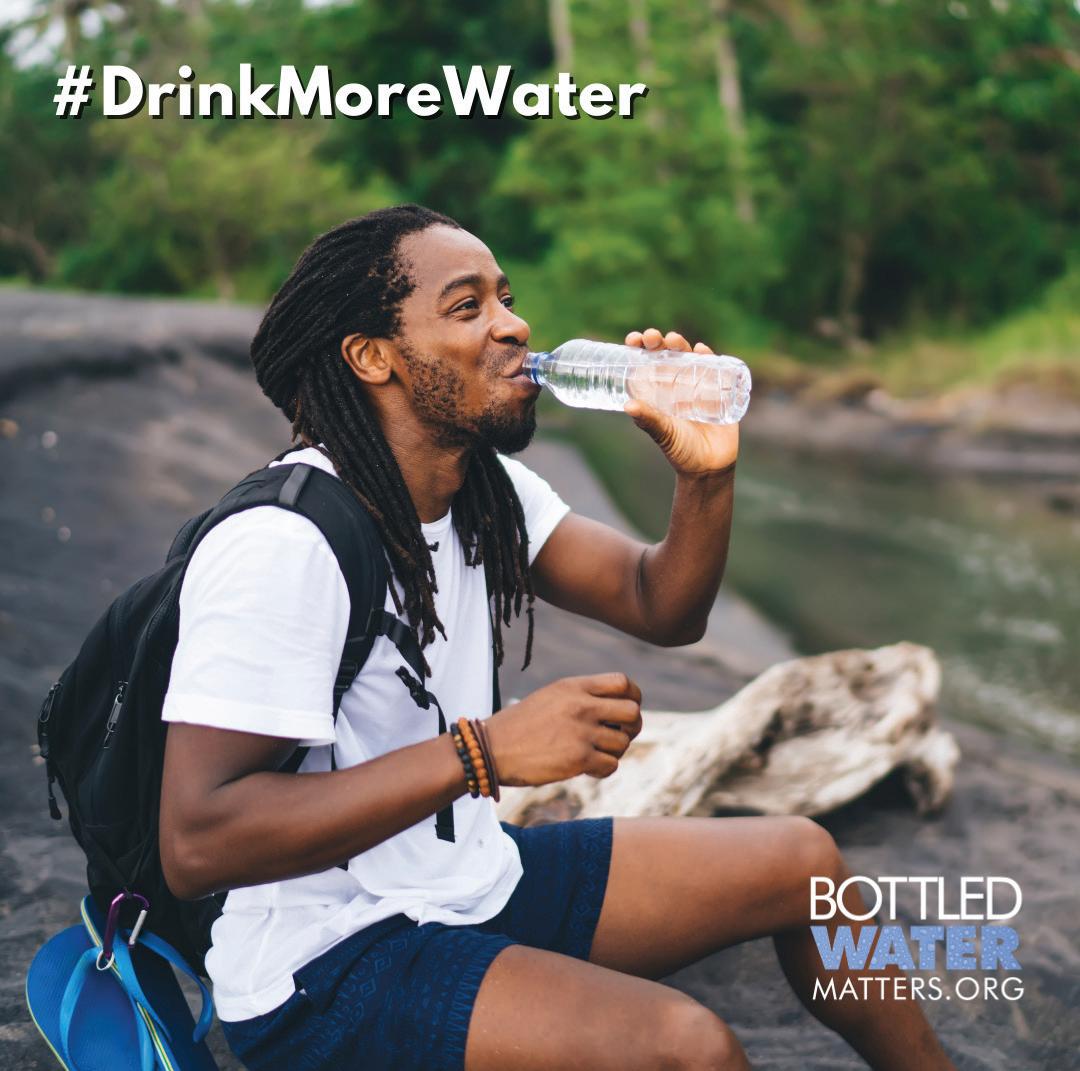

2022 IBWA PROGRESS REPORT | IBWA USES SOCIAL MEDIA TO ENSURE CONSUMERS HAVE ACCESS TO BOTTLED WATER FACTS IBWA PROACTIVELY DEFENDS THE INDUSTRY AGAINST ANY FALSE OR MISLEADING STATEMENTS PUBLISHED ABOUT BOTTLED WATER IBWA STARTED PRODUCING SOCIAL MEDIA REELS IN 2022 TO EDUCATE CONSUMERS
PROMOTING BOTTLED WATER'S SMALL WATER USE
As drought conditions worsened in the western states, particularly California, IBWA developed a campaign to educate the media, consumers, and legislators about the industry’s small water use.
The Hydrate The States campaign includes a dedicated website (www.HydrateTheStates.org) and social media posts to ensure the bottled water industry has a voice in any water scarcity discussions. It’s important that the facts reach the correct audience, so IBWA’s strategy is to focus on residents of specific towns, cities, and states that are most affected by the ongoing drought.
In Q4 of 2022, IBWA launched a social media initiative called “Let’s Be Clear About Bottled Water.” Under the auspices of the larger, Hydrate The States campaign, this effort anticipates critical remarks about our industry’s water use and provides the facts to rebut them.
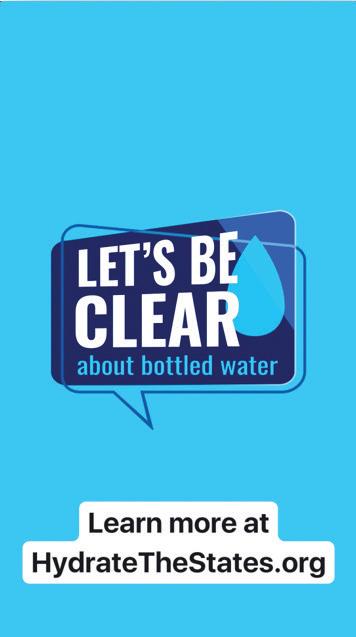
This initiative helps IBWA educate consumers and decision makers in drought-affected areas. Each post from this campaign directs viewers to the Hydrate The States website for more facts about the bottled water industry’s small water use. This is especially important because social media and news reports often incorrectly claim that our industry uses large amounts of water.
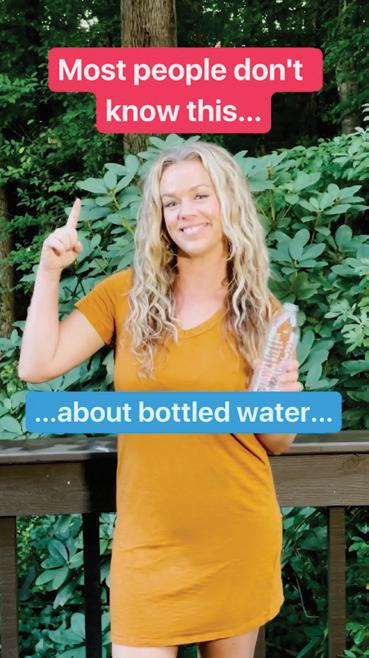
In 2022, the Hydrate The States campaign achieved its goal of reaching more than 3 million people. Perhaps even more impressive is that the campaign recorded engagement rates of 12%, 15%, and 19%—and on Facebook, an engagement rate of 1% is considered very good. Importantly, Google analytics show that 49% of traffic to the campaign website was from people between the ages of 18 and 34, showing our message is reaching potential future bottled water consumers.

IBWA members are encouraged to visit our Facebook and Instagram profiles and share links to all Hydrate
The States campaign materials to help educate consumers and elected officials about our industry’s small water use.
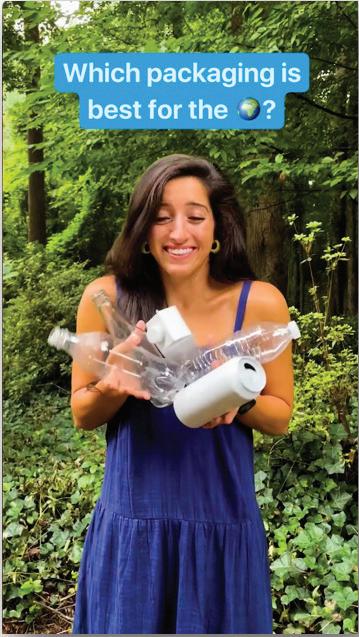

14 | INTERNATIONAL BOTTLED WATER ASSOCIATION
HYDRATE THE STATES
HYDRATE THE STATES MESSAGING REACHED MORE THAN 3 MILLION PEOPLE IN 2022
CERTIFIED PLANT OPERATOR PROGRAM

An integral part of any membership organization is its education program. In addition to a conference education program (see p.20), IBWA’s certified plant operator (CPO) program ensures that member plants are run by plant managers who are qualified—by experience, education, and training—to operate and maintain a bottled water facility. All IBWA bottlers must have one CPO for each bottling plant. To earn the CPO credential, which is valid for three years, members must first pass the CPO exam, which is offered virtually and during IBWA annual meetings.
Since 2021, IBWA has been offering its CPO exam online. CPO candidates can register for, pay for, and take the exam from the education and training portal. The exams are offered on the second Thursday of each month and are proctored by IBWA staff through a Zoom link. Members can access IBWA’s educational portal by logging into www.bottledwater.org.

In 2022, revisions were made to the study reference for the CPO exam, the IBWA Plant Technical Reference Manual. The new manual consists of two volumes and includes information on water chemistry and plant sanitation but also updates to key regulatory issues, including details about the Food Safety and Modernization Act

requirements, and an enhanced chapter on plant and facility security programs.
IBWA currently offers 60 online education sessions on the training portal of its website (bottledwater.org) and continues to add more sessions. Through the portal, CPOs can earn CEUs remotely and keep their certification current by watching the recorded webinars and other programs. All members can use the portal if they see a session they’d like to learn more about.
15 2022 IBWA PROGRESS REPORT |
CPO / MEMBER EDUCATION
THE CPO PROGRAM ENSURES QUALIFIED PLANT MANAGERS RUN IBWA-MEMBER BOTTLING FACILITIES
REGULATIONS
IBWA INSPECTION PROGRAM
In 2022, on-site audits returned as part of the IBWA annual plant inspection program, after two years of performing remote audits due to the COVID-19 pandemic. While some bottlers requested a remote audit, those had to be approved by the Audit Program Evaluation Team. In 2023, IBWA has contracted with NSF International, EAGLE Certification Group, and Eurofins Food Assurance to conduct bottler audits.
To help members pass their audits, IBWA continues to provide Food Safety Modernization Act (FSMA) implementation and compliance guidance via the association’s weekly e-newsletter, Splash; quarterly magazine, Bottled Water Reporter, and special email bulletins, as needed. Members that use IBWA’s detailed guidance on the requirements of the FSMA Preventive Controls Rule and audit check sheets are best prepared for an FDA inspection.
“HEALTHY” LABELING
FOR BOTTLED WATER PRODUCTS
Current FDA regulations do not allow bottled water to be labeled as “healthy,” although it is the healthiest packaged beverage on store shelves. For the past several years, IBWA has submitted written and oral comments to FDA and met with agency officials to urge them to revise the regulations so that bottled water products can use the word “healthy” on the label. Our hard work paid
off when FDA issued a proposed rule in late September 2022 that would allow bottled water products to be labeled as “healthy.”
FDA is seeking comments on the proposed rule, including whether allowing bottled water to be labeled as “healthy” could potentially lead some consumers to believe that it is healthier than tap water. In 2023, IBWA will again submit comments to FDA urging the agency to allow bottled water products to be labeled as “healthy.”
FDA FLUORIDE LABELING REGULATION
FDA issued its final rule for fluoride added to bottled water products in 2022. The final rule amended the allowable level of added fluoride to 0.7 milligrams per liter. The regulation went into effect on June 19, 2022, and the compliance date was October 17. IBWA staff worked with our counsel (Hogan Lovells) to prepare a one-page summary of the final rule for members, which is available on the members' only side of www.bottledwater.org.
FDA made several changes to the original proposed regulation based on IBWA’s comments. This included allowing the disclosure of the per-liter amount of fluoride in bottled water rather than the per-serving amount. Importantly, the new rule does not change the
previously granted enforcement discretion from FDA to IBWA members. So, members of the association still do not need to include a nutrition facts panel on the product label if they merely state that fluoride is added or disclose how much fluoride is added.
MICROPLASTICS
Microplastic particles are found everywhere (including the soil, air, and water), and research continues on the topic. In fact, a 2022 World Health Organization (WHO) report looking at water, food, and beverages concluded that no adverse health effects could be drawn from dietary exposure to nano and microplastic particles less than 10 microns due to minimal scientific research. Currently, no scientific agreement exists on what amount of microplastics, if any, presents a human health risk. Even so, California has established testing methods and will begin monitoring for microplastics in tap water sources in 2023. For the moment, the state has not set a Public Health Goal or regulatory level due to a lack of scientific evidence on the health impact on humans. IBWA continues to follow this matter closely because whatever standards are adopted for tap water in California will very likely be applied to bottled water at a later date.
16 | INTERNATIONAL BOTTLED
ASSOCIATION
WATER



FDA HAS ISSUED A PROPOSED RULE THAT WOULD ALLOW BOTTLED WATER PRODUCTS TO BE LABELED AS "HEALTHY" FDA'S FINAL RULE ON FLUORIDE INCLUDES SEVERAL CHANGES RECOMMENDED BY IBWA A 2022 WHO REPORT CONCLUDED NO ADVERSE HEALTH EFFECTS COULD BE DRAWN FROM DIETARY EXPOSURE TO NANO AND MICROPLASTIC PARTICLES LESS THAN 10 MICRONS












IBWA'S EFFORTS TO HAVE WATER ADDED TO THE MYPLATE NUTRITION GUIDANCE WILL CONTINUE IN 2023 FDA'S TOTAL DIET STUDY TESTED FOR THE ELEMENTS LISTED ABOVE IN FOOD, BEVERAGES, AND WATER IBWA'S GOAL IS TO ENSURE THE DIETARY GUIDELINES FOR AMERICANS CONTINUE TO RECOGNIZE THE IMPORTANT ROLE WATER PLAYS IN A HEALTHY DIET *IBWA'S PROPOSED MYPLATE REVISION
HEALTHY HYDRATION PROMOTION
2025-2030 DIETARY GUIDELINES FOR AMERICANS
The process for preparing the 2025-2030 Dietary Guidelines for Americans (DGAs) has begun. IBWA’s goal is to ensure the continued recognition of the important role water plays in a healthy diet. Several of IBWA’s past recommendations were included in the most recent edition of the dietary guidelines, which were issued in 2020. In particular, the current guidelines state that calorie-free drinks—especially water—should be the primary beverages consumed.
The guidelines encourage a shift to healthier, no sugar added beverages, such as water, in place of sugarsweetened beverages. Importantly, the 2020 DGAs stress the health benefits of drinking water for older adults.
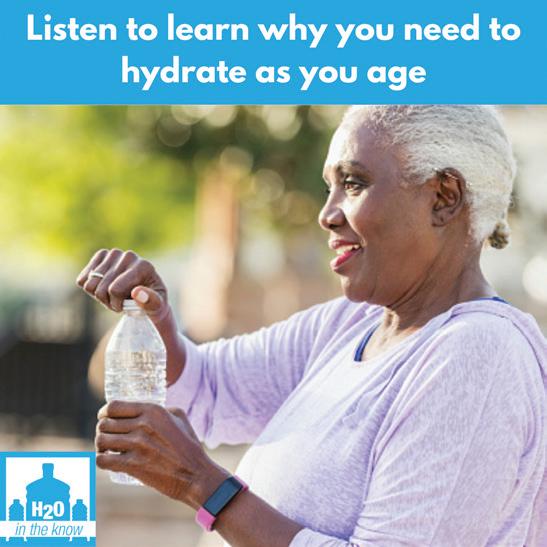
IBWA has provided preliminary written comments with suggested dietary guidelines topics and questions for the 2025-2030 DGAs. We have also nominated several hydration experts to be members of the 2025 Dietary Guidelines Advisory Committee.
In 2023, we will continue our efforts to have water included on the MyPlate nutrition guidance, in addition to dairy. At least 48 other countries include water in their nutrition guidance documents. The United States needs to catch up with the rest of the world on this important issue.
FDA TOTAL DIET STUDY
FDA recently released its Total Diet Study Report for 2018–2020. The study tested both bottled water and bottled water intended for infants. All results for bottled water fell below the FDA's Standards of Quality, including those for lead, arsenic, cadmium,
or mercury. And bottled water intended for infants had no detectable levels of those four substances. We know that bottled water products are safe and meet FDA regulations; however, it is nice when the government agency charged with regulating foods confirms that fact.
“H2O In The Know” Podcast Encourages Water Consumption
IBWA interviewed Evan Johnson, PhD, for the association’s “H20 In The Know” podcast. Johnson, who is an associate professor in the Division of Kinesiology and Health at the University of Wyoming, is working on research that reveals interesting connections between the critical role water consumption plays in healthy aging.
IBWA first interviewed Johnson for a healthy hydration edition of Bottled Water Reporter magazine, and the descriptions of his team's research left us wanting to know more. Johnson’s study reveals encouraging findings on a possible link between low water intake and various forms of dysfunction as individuals age—including cognitive and balance issues, heart and kidney disease, and nocturia (a condition that causes you to wake up during the night to urinate). Because dehydration is often a cause of hospitalization among elderly people, it’s important for IBWA to continue to educate people on how a long-term increase in fluid intake to meet or exceed recommended daily water goals could potentially mitigate some of the negative health consequences associated with aging. Listen to this episode of IBWA’s “H2O In The Know” podcast here: bit.ly/IBWA_H2OInTheKnow.
19 2022 IBWA PROGRESS REPORT |
NO ORDINARY TRADE ASSOCIATION
IBWA members have created a closeknit community of like-minded professionals—bottlers, suppliers, and distributors—some of whom have family connections to IBWA since the association was founded in 1958. We are motivated not only to help our members produce quality bottled water products that provide safe, healthy hydration to consumers but also to maintain a business, regulatory, and public affairs climate that protects and advances the interests of all IBWA members.
KEY ISSUE FORUMS
The issues that impact the day-to-day operations of water bottlers are numerous and diverse: inflation, the environment, tariffs, FDA policies, changing customer preferences, etc. In 2022, IBWA offered three opportunities for members and IBWA leaders to come together to discuss current industry issues. These Key Issue Forums provided an open platform for spontaneous discussion, giving members a chance to learn from the wisdom and experience of their peers.
CONFERENCE AND TRADE SHOW
After two virtual annual conferences due to the COVID-19 pandemic, the 2022 IBWA Annual Business Conference and Trade Show was held in-person for the first time since 2019. From November 24-27, members gathered in Chicago to learn, network, and reconnect
with their industry peers. The conference education program offered 14 technical and business education sessions—covering timely topics such as cyber security, market trends, and innovative business strategies. An active trade show floor provided supplier members the chance to discuss with attendees the new products and services created during the pandemic break. This year was an “awards year” for the conference—as the association holds our awards program every two years. IBWA staff and members know that it is important to take time to celebrate the achievements of the incredible and dedicated workforce that produces and delivers our bottled water products.
PAC: A VITAL EDUCATIONAL TOOL
IBWA’s community extends to those who are champions of our industry. IBWA’s Political Action Committee (PAC) is a vital tool used to educate members of Congress and build relationships with political candidates who understand the important role bottled water plays in providing healthy hydration. Due to the generosity of our members, IBWA was able to support several key members of Congress in their 2022 reelection efforts. We expect to see many important issues pass through Washington, DC, and the state capitals in 2023, so it is more important than ever that IBWA has the
opportunity to educated legislators about our products, our work policies, and the science that details any impact our industry has on the environment.
LOOKING AHEAD
While IBWA accomplished a lot in 2022, more opportunities and challenges await us in 2023. IBWA’s mission remains the same as it has always been: to create a political and public affairs environment that helps our members provide life-sustaining and life-affirming bottled water. We’ll tackle any issue before us with the force that it deserves—and with the knowledge that what our members do is important. Every day, IBWA members provide consumers the choice of healthy hydration—packaged in the most environmentally sustainable containers available.
IBWA—with our talented team of members, consultants, and staff—will continue to promote the benefits of bottled water and push back against the false claims that our critics make about our products. We will continue to fight hard every day to defend our member companies by educating legislators, regulators, the media, and the public about the important role the bottled water industry plays in ensuring safe, convenient, quality drinking water is available where it is wanted and where it is needed.
20 | INTERNATIONAL BOTTLED WATER ASSOCIATION
COMMUNITY

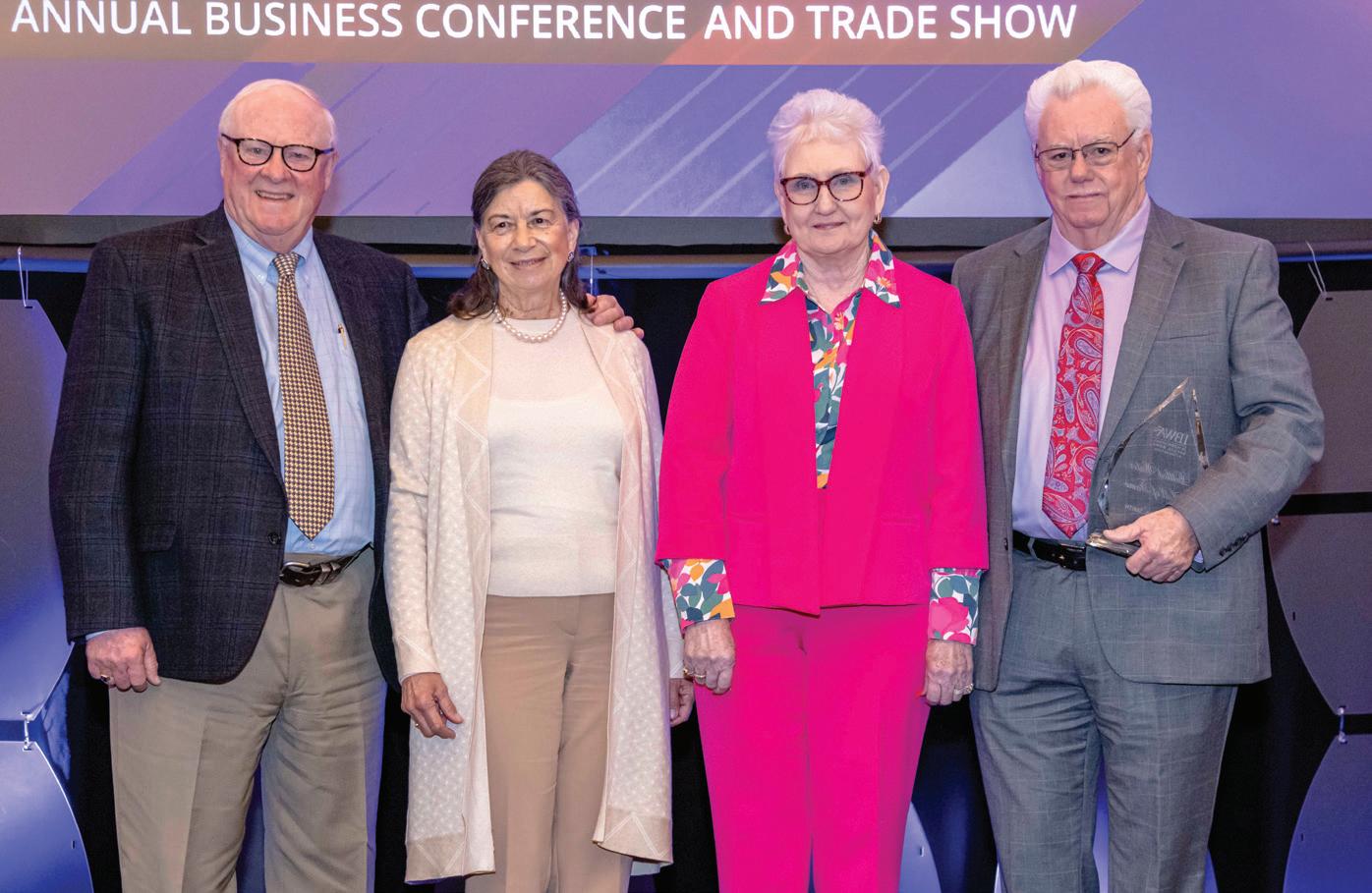




3 2022 IBWA PROGRESS REPORT | CHICAGO 2022 ANNUAL BUSINESS CONFERENCE AND TRADE SHOW OCT. 24 - 27 KEY ISSUE FORUMS PROVIDE MEMBERS A CHANCE TO LEARN FROM THE WISDOM AND EXPERIENCE OF THEIR PEERS IBWA'S AWARD PROGRAM CELEBRATES THE ACHIEVEMENTS OF THE BOTTLED WATER INDUSTRY'S DEDICATED WORKFORCE THE 2022 IBWA ANNUAL BUSINESS CONFERENCE AND TRADE SHOW WAS HELD IN-PERSON FOR THE FIRST TIME SINCE 2019
THE INTERNATIONAL BOTTLED WATER ASSOCIATION



IBWA is the authoritative source of information about all types of bottled waters, including spring, mineral, purified, artesian, and sparkling. Founded in 1958, IBWA’s membership includes U.S. and international bottlers, distributors, and suppliers. IBWA is committed to working with the U.S. Food and Drug Administration (FDA), which regulates bottled water as a packaged food product, to establish comprehensive and stringent standards for safe, high-quality bottled water.














In addition to FDA regulations, IBWA member bottlers must adhere to the IBWA Bottled Water Code of Practice, which mandates additional standards and practices that in some cases are more stringent than federal and state regulations. A key feature of the IBWA Bottled Water Code of Practice is a mandatory annual plant inspection by an independent, third-party organization.

703.683.5213 | WWW.BOTTLEDWATER.ORG
BWRWWW.BOTTLEDWATER.ORG IN THIS ISSUE A PUBLICATION OF THE INTERNATIONAL BOTTLED WATER ASSOCIATION BOTTLED WATER REPORTER SUMMER 2022 Facts That Debunk Bottled Water Myths Take IBWA's Online CPO Exam EPR Programs Find Support in the States 2022 IBWA BUYERS' GUIDE BOTTLED WATER VOLUME SURGES TO ALL-TIME HIGH CHICAGO 2022 ANNUAL BUSINESS CONFERENCE AND TRADE SHOW OCT. 24 - 27







































































































